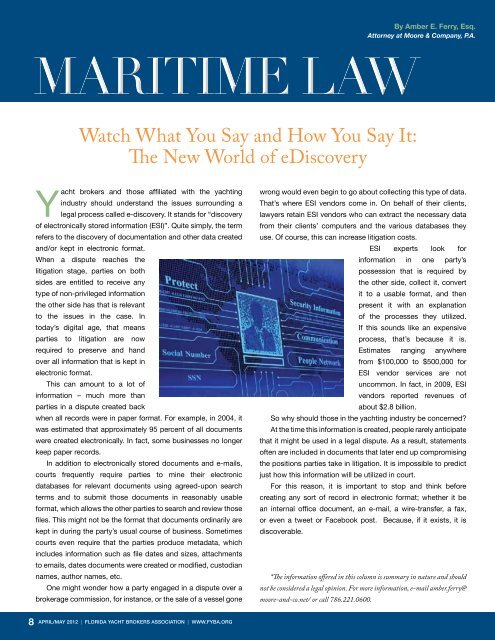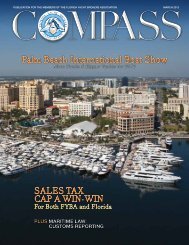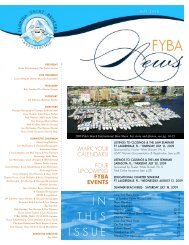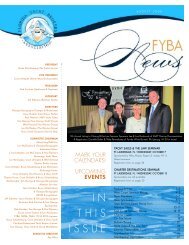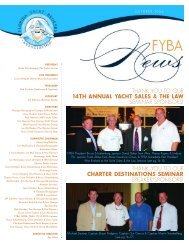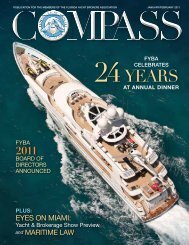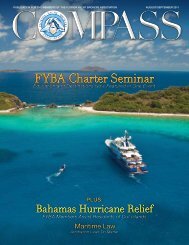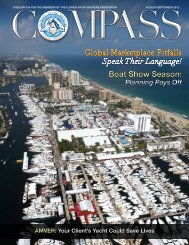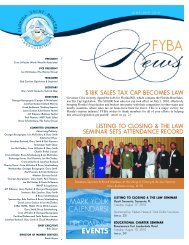From the desk of - Florida Yacht Brokers Association, Inc.
From the desk of - Florida Yacht Brokers Association, Inc.
From the desk of - Florida Yacht Brokers Association, Inc.
Create successful ePaper yourself
Turn your PDF publications into a flip-book with our unique Google optimized e-Paper software.
MaritiMe Law<br />
8<br />
Watch What You Say and How You Say It:<br />
The New World <strong>of</strong> eDiscovery<br />
<strong>Yacht</strong> brokers and those affiliated with <strong>the</strong> yachting<br />
industry should understand <strong>the</strong> issues surrounding a<br />
legal process called e-discovery. It stands for “discovery<br />
<strong>of</strong> electronically stored information (ESI)”. Quite simply, <strong>the</strong> term<br />
refers to <strong>the</strong> discovery <strong>of</strong> documentation and o<strong>the</strong>r data created<br />
and/or kept in electronic format.<br />
When a dispute reaches <strong>the</strong><br />
litigation stage, parties on both<br />
sides are entitled to receive any<br />
type <strong>of</strong> non-privileged information<br />
<strong>the</strong> o<strong>the</strong>r side has that is relevant<br />
to <strong>the</strong> issues in <strong>the</strong> case. In<br />
today’s digital age, that means<br />
parties to litigation are now<br />
required to preserve and hand<br />
over all information that is kept in<br />
electronic format.<br />
This can amount to a lot <strong>of</strong><br />
information – much more than<br />
parties in a dispute created back<br />
when all records were in paper format. For example, in 2004, it<br />
was estimated that approximately 95 percent <strong>of</strong> all documents<br />
were created electronically. In fact, some businesses no longer<br />
keep paper records.<br />
In addition to electronically stored documents and e-mails,<br />
courts frequently require parties to mine <strong>the</strong>ir electronic<br />
databases for relevant documents using agreed-upon search<br />
terms and to submit those documents in reasonably usable<br />
format, which allows <strong>the</strong> o<strong>the</strong>r parties to search and review those<br />
files. This might not be <strong>the</strong> format that documents ordinarily are<br />
kept in during <strong>the</strong> party’s usual course <strong>of</strong> business. Sometimes<br />
courts even require that <strong>the</strong> parties produce metadata, which<br />
includes information such as file dates and sizes, attachments<br />
to emails, dates documents were created or modified, custodian<br />
names, author names, etc.<br />
One might wonder how a party engaged in a dispute over a<br />
brokerage commission, for instance, or <strong>the</strong> sale <strong>of</strong> a vessel gone<br />
APRIL/mAy 2012 | fLoRIdA yAcht bRokeRs AssocIAtIon | www.fybA.oRg<br />
By Amber e. Ferry, esq.<br />
attorney at Moore & Company, P.a.<br />
wrong would even begin to go about collecting this type <strong>of</strong> data.<br />
That’s where ESI vendors come in. On behalf <strong>of</strong> <strong>the</strong>ir clients,<br />
lawyers retain ESI vendors who can extract <strong>the</strong> necessary data<br />
from <strong>the</strong>ir clients’ computers and <strong>the</strong> various databases <strong>the</strong>y<br />
use. Of course, this can increase litigation costs.<br />
ESI experts look for<br />
information in one party’s<br />
possession that is required by<br />
<strong>the</strong> o<strong>the</strong>r side, collect it, convert<br />
it to a usable format, and <strong>the</strong>n<br />
present it with an explanation<br />
<strong>of</strong> <strong>the</strong> processes <strong>the</strong>y utilized.<br />
If this sounds like an expensive<br />
process, that’s because it is.<br />
Estimates ranging anywhere<br />
from $100,000 to $500,000 for<br />
ESI vendor services are not<br />
uncommon. In fact, in 2009, ESI<br />
vendors reported revenues <strong>of</strong><br />
about $2.8 billion.<br />
So why should those in <strong>the</strong> yachting industry be concerned?<br />
At <strong>the</strong> time this information is created, people rarely anticipate<br />
that it might be used in a legal dispute. As a result, statements<br />
<strong>of</strong>ten are included in documents that later end up compromising<br />
<strong>the</strong> positions parties take in litigation. It is impossible to predict<br />
just how this information will be utilized in court.<br />
For this reason, it is important to stop and think before<br />
creating any sort <strong>of</strong> record in electronic format; whe<strong>the</strong>r it be<br />
an internal <strong>of</strong>fice document, an e-mail, a wire-transfer, a fax,<br />
or even a tweet or Facebook post. Because, if it exists, it is<br />
discoverable.<br />
*The information <strong>of</strong>fered in this column is summary in nature and should<br />
not be considered a legal opinion. For more information, e-mail amber.ferry@<br />
moore-and-co.net/ or call 786.221.0600.


